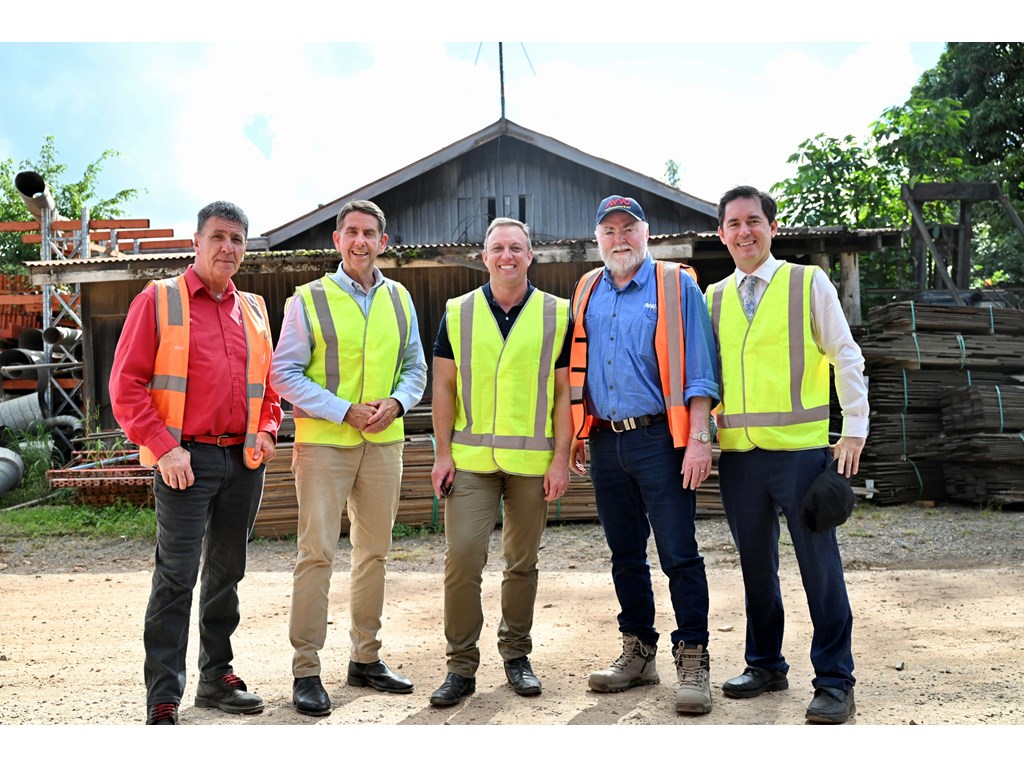Published Wednesday, 26 June, 2024 at 10:30 AM

JOINT STATEMENT
Premier
The Honourable Steven Miles
Deputy Premier, Treasurer and Minister for Trade and Investment
The Honourable Cameron Dick

Miles Doing What Matters: A strong, sustainable future for Queensland timber
- Miles Labor Government releases landmark 30 year Queensland Sustainable Timber Industry Framework.
- Backed by a $200 million package that will support the future of the industry – securing good timber jobs and timber supply.
- New Greater Glider Forest Park to be established, protecting high value ecosystems and threatened species.
Premier Steven Miles and Deputy Premier Cameron Dick yesterday joined timber workers in Maryborough to embark on developing a landmark, 30-year framework for the timber industry.
The terms of reference for the framework were released today, outlining the Miles Government’s commitment to a sustainable long-term future for Queensland’s timber industry.
As a critical employer and supply source for Queensland’s $107 billion Big Build, it’s important that the industry has the certainty it needs to support jobs now, and into the future.
The Queensland Sustainable Timber Industry Framework will be backed a $200 million package, announced today.
This package will support the development and implementation of actions out of the framework, including:
- Support for timber plantation expansion and innovation in timber processing.
- Potential subsidies to assist industry with increased transport costs.
- Increased accreditation and certification support.
- An education and extension program with landholders and traditional owners.
- A comprehensive state-wide assessment of biodiversity values mapping to establish best management of native forests and support decision-making.
- Additional rangers.
Securing sustainable timber supply to ensure Queensland’s housing needs are met is also a key commitment of the framework.
That is why, the Framework will start from a baseline that there should be no reduction in current overall timber supply levels between 2025 and the end of 2034.
Detailed work will be undertaken to understand the full supply and demand picture and consider how to best secure future sustainable supply including potentially through harvesting in central and northern regions, while new plantations progress.
The regulatory framework for private native timber will also be updated and improved including the establishment of a new ‘Category F’ under the Forestry Act 1959.
Best practice forest management on private land will also be supported through an education and extension program with landholders and traditional owners.
The Framework will be in place by mid-2025 and will be finalised with support from a dedicated stakeholder advisory group.
While the Framework is developed, harvesting permits for the Eastern Hardwoods, other than areas transitioning to Natural Capital Reserve, will be issued by the end of July 2024 for a further two years to the end of 2026. The existing forestry code will also continue until it is replaced at the end of 2026.
The Miles Government is on track to deliver an existing commitment to transfer up to 20,000 hectares of state forest to protected area by the end of 2024.
Quotes attributable to the Premier Steven Miles:
“Queensland’s timber industry is the backbone of the housing and building sectors.
“That’s why I’m doing what matters to support timber workers and the industry to continue building our state, while also increasing our protected area estate.
“The terms of reference released today map out our priorities as a government – that is, timber supply security, environmental protections, jobs and diverse employment opportunities.
“I want to thank the stakeholders who have worked with us to develop this plan, who will be invaluable parts of the framework’s development moving forward.
“Queensland is the envy of the world with beautiful and iconic locations, and only my government is ensuring it stays that way for my kids, your kids and generations of Queenslanders to come.”
Quotes attributable to Deputy Premier and Treasurer Cameron Dick:
“Our Government is committed to ensuring the long-term sustainability of businesses and jobs in Queensland’s traditional industries like forestry, mining, agriculture and tourism.
The COVID pandemic reminded us of the importance of strong local supply chains, and there’s no supply chain more important right now than being able to build more homes for Queenslanders.
“By protecting traditional jobs, housing materials supply and our environment, we are doing what matters for Queenslanders.
Further information:
Queensland’s timber industry is made up of both hardwoods and softwoods, with approximately 60% of hardwood coming from private land and 40% from state forests.
The softwood plantation sector makes a significant contribution to the Queensland economy accounting for around 80 per cent by volume, of the locally grown timber processed in Queensland.
More than 1.8 million cubic metres of softwood plantation timber is currently harvested each year in Queensland.
Softwoods from plantations are a key input for housing construction accounting for the vast majority of construction wood use by volume – mostly for frames and trusses.
The Terms of Reference are available online here.
Key actions:
The Queensland Sustainable Timber Industry Framework will include six priority areas:
- Priority Area 1 – Securing sustainable timber supply.
- Priority Area 2 – Adding value to forest and timber supply chains.
- Priority Area 3 – Realising the potential of forest-related markets for industry, landholders and the environment.
- Priority Area 4 – A future forest workforce and strong timber industry.
- Priority Area 5 – Growing Queensland’s protected area estate.
- Priority Area 6 – Fostering First Nations forestry employment and enterprise opportunities.
ENDS

